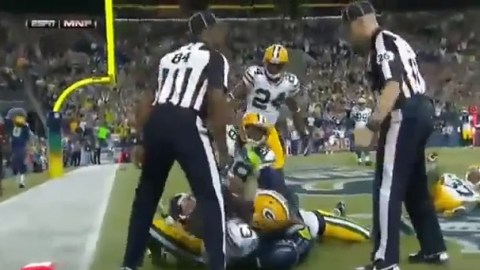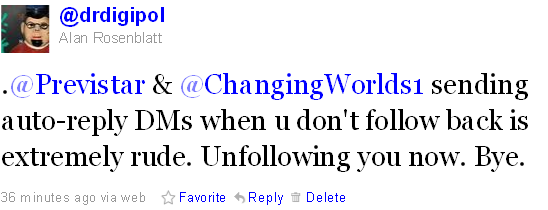You Cannot Be Serious: Bring Sports Into The 21st Century

[Updated: 9/25/12] While NFL replacement refs blow call after call after call, it is clearly time for the Commissioner to resolve the labor dispute, bring back the pros, and restore some integrity to the game. However, I have long believed that sports in the 21st century will never have full integrity until the rules catch up with technology.
After all, if you watched last year’s Super Bowl on your couch you were in a better position to referee the action than the officials on the field in Indianapolis. Just consider the technology you had at your disposal: 40 cameras to track every angle of every play. Some cameras are equipped with super zoom lenses while others offer super slow motion capabilities. The Skycam maneuvers directly over the players’ heads to provide a God’s eye view of the action while the 1st & Ten graphics system generates a fluorescent yellow line to tell you precisely where the first down marker is. Whoops, you blinked. No worries, four different cameras recorded the play at 1,000 frames per second. Play the footage back and you’ll make the right call.
While this technological tour de force was created to maximize the entertainment value of America’s greatest sporting event, technology has disrupted the game itself. Digital enhancements have created an augmented reality in which the experience on TV is richer than the referee’s view. Technology has therefore increased our expectation for the way the game is officiated and exposed the utter fallibility of those mortals in zebra stripes. Sorry refs, it’s not necessarily best to be the closest to the action. Better to have 40 different camera angles to scrutinize.
Granted, it’s not easy to be a referee. We only remember their names when they make bad calls. Football officials are only able to review video footage on a limited number of plays during the game. To make matters worse, the decision to challenge a call is left to those with the least objectivity on the field — the opposing coaches. And this is how the rules incentivize them to act: “Don’t use up your challenges now, coach, because while you might think that call was bad, just wait until we really screw up the next one!“
Isn’t it time for all of professional sports to embrace available technology and give referees the tools to use technology at their discretion in order to make the right call? They could sure use the help. According to an ESPN analysis, when it comes to close calls in baseball, umpires are only 80 percent accurate. If you understand the limitations of the human eye, that statistic shouldn’t be all that surprising.
For instance, in so-called bang-bang plays at first base, umpires tend to listen for the sound of the ball hitting the first baseman’s mitt, and will use their eyes to see when the runner’s foot hits the bag. But suppose the throw is a soft toss to first base and the crowd is abnormally loud, as the case might be if a pitcher is about to complete the last out of a perfect game. That situation was more or less the case when an absolutely heartbreaking blown call spoiled Armando Galarraga’s perfect game in 2010. The first base umpire Jim Joyce later apologized when he saw a replay, and indicated he would have reversed himself. So why not allow him the chance?
The so-called purist counter-argument goes like this: life isn’t fair, and neither is sports. Sporting competitions are fraught with human errors, and that is just part of the game. Moreover, contested calls have made for some of the most memorable moments in sports, like this one at Wimbledon in 1981:
Tennis, of all sports, has finally caught up with the 21st century by introducing the so-called Hawk-Eye technology, which as blogger Daniel Larson writes, has “proven that cameras and computers can see what humans can’t: the exact – not just the close – paths and landings of spheres moving in excess of 150 miles per hour.”
Camera technology is only getting better. In order to capture a samurai (amazingly!) slicing a BB gun pellet with a sword, researchers used a camera that slowed down the action by 250 times. Watch the video here:
Some obviously take the argument in favor of instant replay way too far. Case in point: the conspiracy theory-wielding Oakland Raiders owner Al Davis, who told ESPN, “If we had had instant replay in the ’70s, we’d have probably been in 10 Super Bowls.” The Raiders, of course, have been on the losing end of some of the most controversial calls in NFL history, including the infamous, “Immaculate Reception” against the Pittsburg Steelers. And yet, 10 Super Bowls, really? Davis just sounds like a sore loser.
What’s the Significance?
A criminal defense lawyer once told me how elated he was about the use of instant replay in professional football. This would teach citizens fundamental lessons about the nature of evidence, which he believed would help jurors better grasp the burden of proof in the courtroom.
Indeed, the debate over instant replay in sports is larger than sports. It’s about how we chose to integrate technology into all aspects of society, and how technology can help make the game of life more fair. Sticking with the lawyer’s analogy, how do we referee the law? Imagine if a traffic cop had access to a radar gun, yet preferred to rely on the naked eye to determine if you were speeding.
Others worry that in law, like sports, we are setting an impossible standard of evidence due to our almost messianic faith in technology to solve the most baffling crimes. This is called the CSI effect. Imagine if jurors held all crime scene investigation units to the same standard as their fictional counterparts on TV. Prosecutors worry that jurors do just that today.
Moreover, what if technology, which is supposed to make things faster, actually ends up making everything take a lot longer — from jury trials to football games — because we have to review absolutely everything?
That may be true, but doesn’t this slow things down as well:
Photo courtesy of Shutterstock.
Follow Daniel Honan on Twitter @DanielHonan





